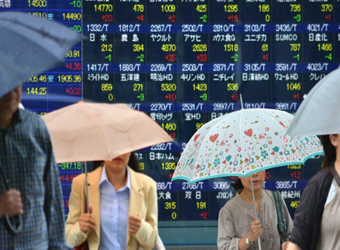Investors also digested the release of House Republicans’ tax-reform plan and President Trump’s nomination of Jerome Powell, Federal Reserve Governor, to be the next head of the central bank.
South Korea’s Kospi reversed early losses to close up 0.46 percent at 2,557.97 as automakers notched gains: Hyundai Motor closed up 0.94 percent and Kia Motors rose 0.28 percent. Blue-chip tech stocks were mixed as investors took profits. Samsung Electronics fell 1.19 percent by the end of the session after it announced a record profit earlier this week.
Apple suppliers in Asia were in focus after the iPhone maker posted an earnings beat on Thursday. Apple, which launched iPhone X sales on Friday, also said its iPhone 8 and iPhone 8 Plus models had “instantly” become top-selling products.
South Korea’s LG Display closed flat and LG Innotek shed 0.57 percent. Taiwanese Apple suppliers, however, had a more upbeat session: Camera lens supplier Largan Precision soared 3.64 percent on the day and Hon Hai Precision Industry ended 0.44 percent higher.
Down Under, the S&P/ASX 200 rose 0.47 percent to end at 5,959.88, with mining stocks popping on the day. Rio Tinto added 1.06 percent in the session, Kingsgate soared 6.82 percent and Newcrest Mining closed up 2.45 percent.
Greater China markets were mixed. Hong Kong’s Hang Seng Index was up 0.28 percent by 3:07 p.m. HK/SIN while mainland markets recorded losses: The Shanghai Composite slid 0.36 percent to close at 3,371.21 and the Shenzhen Composite lost 0.71 percent to finish the session at 1,975.92. The Caixin services PMI for October released Friday came in at 51.2. The official metric for non-manufacturing activity had come in at 54.3.
The Caixin services PMI for October released Friday came in at 51.2. The official metric for non-manufacturing activity had come in at 54.3.
Also of note, authorities issued draft guidelines regarding the overseas investments of Chinese companies. Those new rules will mean companies have to get approval for foreign deals conducted through their offshore subsidiaries, although other regulations were streamlined, Reuters reported.
Markets in Japan are closed for Culture Day.
U.S. stocks closed mostly higher on Thursday as investors parsed through tax reform details. The Dow Jones industrial average rose 0.35 percent, or 81.25 points, to close at 23,516.26.
Trump announced Powell would become the chairman of the Federal Reserve when current Chair Janet Yellen steps down at the end of her term next year. The move had been mostly expected by investors.
Powell is seen by markets as a “continuity candidate” whose thinking is “very much allied to the status quo data-driven style at the Fed,” David de Garis, director of economics at National Australia Bank, said in a note.
Also on Thursday, House Republicans released details of a highly-anticipated tax-reform plan although market moves were subdued. The corporate tax rate would be reduced to 20 percent from 35 percent under the plan.
“Currency and stock markets have adopted a largely wait and see response both to news that Jerome Powell will be nominated as Fed Chair and to the release of US tax reform proposals,” Ric Spooner, chief market analyst at CMC Markets, said in a note.
Ahead, investors awaited the release of nonfarm payrolls data during U.S. hours. Private-sector jobs created in October had come in at 235,000, topping expectations.
Elsewhere, the Bank of England raised interest rates by 25 basis points on Thursday — its first time hiking rates in more than a decade. While policymakers voted seven to two to increase the benchmark rate to 0.5 percent, the move was seen as relatively dovish by markets.
In response, the British pound was mostly flat at $1.3059 at 3:13 p.m. HK/SIN after falling as low as $1.3045 earlier in the session. That compared to levels around the $1.32 handle in the rest of the week.
China Huishan Dairy Holdings, which saw its stock fall 90 percent in March, has reached a deal with more than half of its Chinese creditors on a debt restructuring plan representing above two-thirds of the outstanding amount it owes, the company said in a filing to the Hong Kong Exchange.
Alibaba Group Holding announced revenues rose 61 percent to 55.1 billion yuan ($8.3 billion) in the quarter ending on Sept. 30 compared to one year ago. The e-commerce giant also raised its guidance for revenues in fiscal year 2018, stating that it expected revenues would grow between 49 percent and 53 percent, compared to an earlier estimated range of 45 percent to 49 percent.
The Australian dollar fell after retail sales for September were unchanged compared to one month ago. That was below the 0.4 percent increase estimated in a Reuters poll. The currency traded at $0.7679 at 3:13 p.m. HK/SIN.
Meanwhile, the dollar index, which tracks the U.S. currency against a basket of six rivals, was little changed following the developments stateside. The index last traded at 94.709.
The greenback edged down against the Japanese yen to trade at 114.07, relatively near its highest levels since July.
Brent crude futures rose 0.16 percent to trade at $60.72 a barrel and U.S. crude climbed 0.28 percent to $54.69.
